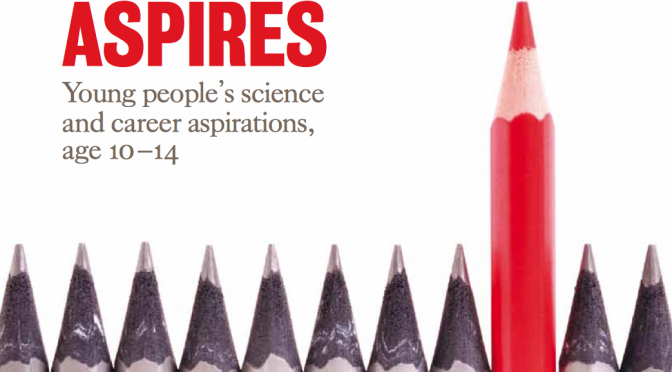A good number of years ago I came across a piece of American research that concluded that the closest indicator to whether a child studied science at a higher level was, aged ten responding positively to ‘being a scientist would make my parents proud’.
Let’s look at that again, shall we? Not ‘I like science’ or ‘I’m good at science’ nor even ‘This really cool scientist is an amazing role model’.
‘Being a scientist would make my parents proud’.
I remember being struck deeply by this. Firstly: ten is young. Many interventions target teens. Secondly: the nuance involved. The child is already prioritising their parent’s hopes over their own interests, and that decision remains true through all their choices. Yikes.
This left me with a profound conclusion. We’ve been targeting the wrong people, folks!
Longitudinal studies are expensive and difficult, but one study isn’t enough to rewrite whole philosophies over, which is why I’ve been following the Aspires project coming out of Kings College, London.
The final report last December tells us ‘Most students like science, but do not aspire to science careers’
Coming strongly out of that research is the concept that family ‘science capital’ is key. This attempts to measure how much science contact families have in daily life – interest, understanding, qualifications, knowing someone with a science career – these all count towards science capital.
Catching kids by themselves may not be enough, working with families and parents might well be more effective, which is why I was delighted to read Alom’s article last week giving some background to the Royal Institution’s new summer project ExpeRimental.
There is no silver bullet, no simple, single answer, but it’s a delight to see projects like this one coming from a recognised national institution based on current research.
It reminds me, I need to dig out more research like this, it helps to mould my thinking. I only wish I knew where to find that original paper. If it rings a bell with anyone, please leave a comment.


Elin
Reading this I feel the need to mention Protons for Breakfast, the science orientation course I have put on at the National Physical Laboratory, twice a year for the last 10 years.
The features relevant to your article are that:
• Simply entering a place like NPL provides ‘Science Capital’.
• We target parents and children learning together, and also older adults. I feel there is a plethora of ‘kidz thingz’ and frankly, it is ‘not my scene’.
• People return for a two-hour session one evening a week over 6 weeks. And they build relationships with me (as presenter) and with real scientists. They discuss with real scientists – often only in their early 20’s – the career choices they made.
• Whatever questions they ask are answered promptly, accurately and fulsomely within one week
• The course discusses the links between the parts of science (mainly physics) with which people are aware e.g. radios and light and electricity and atoms. This credits the intelligence and knowledge of people and makes them feel more personally empowered by their additional understanding.
• We convey the fact that although there are things that are not understood, overwhelmingly the world makes sense and the phenomena of nature can be understood at least partially.
• Absolutely no maths is required.
Sadly the course will die after its next presentation this November, but if anyone wants to pick its bones, please drop me a line and I will be happy to direct you its resource carcass.
Michael
Thanks Michael, I’m sad to hear Protons for Breakfast is coming to an end, I’ve heard good things about it. For this programme ‘though, I suspect most of your participants are older than ten, and already have have a higher than average science capital before they cross the threshold of such a renowned organisation as the NPL.
There is need for a broad spectrum of ways to engage, safe places for people to find out more in depth, but also places to begin nurturing these ideas in the first place.
What I think is interesting about ExpeRimental is that they are using current research and trying to bring science home for those families who might not naturally discuss science across their kitchen tables. Normalising these discussions can change the science capital of those individuals at a young age. A noble goal.
I think, you’re right Elin. We do need to target parents of young(ish) kids. A lot of the educational outreach money has been thrown at teachers of secondary school kids in recent years, and by then it’s probably too late. The kids will have a better experience due to better teaching, but if they’ve already decided that science is not for them then it probably won’t encourage them to take it further.
Thanks Carol,
I wouldn’t say the money hitting teens in schools is totally wasted, but you will have already missed some who could have been interested. Fewer people are interested in funding activities for the under tens, sadly.
I’ve used the PfB resources and steered many teachers in that direction as part of their CPD. It’s a truly excellent venture and I’m sorry to hear that it’s coming to an end.
I’d just like to say thanks for developing it and making it so freely available.